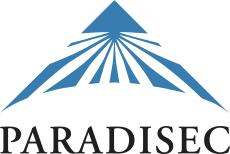PARADISEC has so far focussed on digitising audio tapes, but we intend to build up a repository of digital objects including all the textual material that is currently being produced for theses, dictionaries, grammars, articles and so on.
We are able to digitise audio tapes (reel to reel and cassette). We can arrange for analog movie formats to be digitised.
For existing digital material these are the formats for deposit:
The “Go to” links redirect to our external Technical Guides website, where you will find useful information for preparing your data for archiving.
Text: txt, pdf, rtf, OpenOffice formats (odf, odt etc), xml (including docx, xlsx etc).
Audio: .WAV (as close to the archival standard of 24bit, 96kHz as possible). At present we are not able to ingest 16bit 32khz (LP mode) but depositors should contact us to discuss these options. We have the capacity to ingest minidisc and can assist in archiving minidisc files. We will not archive hundreds of small audio files, please concatenate them into a larger wav file before depositing. Go to: “Audio digitising of analogue tapes”
Images: TIF/ TIFF. For scans of notes in colour: 300 dpi, scanning ratio: 100%, 8 bits per channel RGB, embedded ICC colour profile encouraged, OCR6 encouraged (PDF or PDF/A complies). For no colour then use grayscale (See the National Archives of Australia recommendations)
For photographic negative or slide scans TIF, 600 dpi, 4000 pixels on the longest side, 48 bit colour RGB or 16 bit grayscale. Go to: “Image Capture and Post-production Editing Workflows”
Video: mxf (archival master) & mp4 (access copy). (Possibly other RAW formats). We do most of our born-digital video transcoding in house. We use an external company, DamSmart, to digitise film and process tape-based digital video. We generally require a funding contribution to cover these video and film processing costs. Go to: “Video Processing mp4” and “Video Processing mxf”
Other:
- Files created in Elan are in an xml format and the .eaf file can be deposited as it is, ideally with the same name of the media file it is a transcript of.
- Fieldworks (FLEx) files need to be exported to xml (one for the lexicon and one for the text). If you have bundled sound and image files into the FLEx project, they need to be separated as they are typically not in an archival format. We can archive a fwbackup file if it contains only text in xml format (its native format) , but not if it contains audio and images.
- ZIP files are archived in the special case of large bundles (several hundred +) of small files, whether media files, text, or other.
